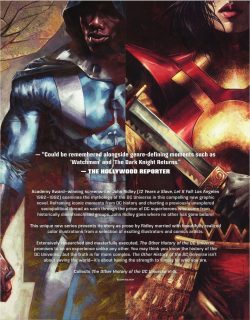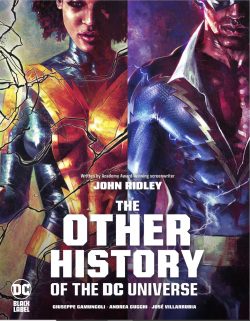

By John Ridley, Giuseppe Camuncoli, Andrea Cucchi, José Villarrubia & various (DC Comics)
ISBN: 978-1-7795-1197-3 (HB/Digital edition)
Win’s Christmas Gift Recommendation: Hard-Hitting, Strong Medicine… 9/10
The evolution and assimilation of non-white, non-standard characters – defined and othered by skin colour, religion, ethnicity and who loves whom – has been in most mass media what author and screenwriter John Ridley (12 Years a Slave; Future State: The Next Batman) has described as “measured progressiveness”.
That’s especially true in comics, where incremental firsts have been applauded – and rightly so, as the industry has always been at the forefront of progressive thinking and action – but has also suffered from a tickbox mentality where true change has been slow to materialise and hard to sustain. We can say “first black superhero”, “first gay hero”, “first interracial marriage” or “first same-sex kiss” , but other than offering a glimmer of acceptance, and recognition, what has changed?
It’s certainly better than an all-white, all-male milieu where “different” equates to “lesser than”, where more than 50% of the populace and who knows how much of the readership doesn’t conform to proposed norms and are reduced to eye-candy, plot props and useless bystanders (not even competent villains who at least have agency!). For the longest time these attitudes were tacitly enshrined on funnybook pages – and not even for sinister reasons – but what appears to simply be an unconscious acceptance of an unchallenged status quo…
You can read other books or even some previous posts here from the last month for background, if you want, but here and now, I’m pointing you towards a fascinating and gripping series recently collected as an answer to that situation.
Here Ridley – with illustrators Giuseppe Camuncoli, Andrea Cucchi, José Villarrubia and letterer Steve Wands – re-examines and deconstructs DC’s record of Diversity progress via all those slow incremental steps and breakthroughs: interpreting through the eyes and attitudes of the revolutionary characters the company added but with modern sensibilities and opinions in play…
Filtered from a socio-political perspective and assessment of those times – but not in the comfortably parochial “everything’s basically fine” tones of a white, male middle class parental audience-placator – you’ll learn a different history: one told not under Comics Code Restrictions, or commercial interests sanitising culture and attitude to keep (covertly and actively) racist authorities from embargoing titles but as heroic individuals finally telling their sides of a well-known story.
Published under DC’s Black Label mature reader imprint it begins with the story of Black Lighting in Book One – 1972-1995: Jefferson Pierce. Here we see the inner workings of an African American former Olympian who became a school teacher and vigilante to save lives and how it destroyed and damaged his family, after which Book Two – 1970-1989: Karen Beecher-Duncan & Mal Duncan recounts in their words how being the tokens on a team of white privileged teen super do-gooders shaped their lives and relationship.
A far darker divergence is applied to Japanese warrior/assassin Katana in Book Three – 1983-1996: (plus the kanji for Yamashiro Tatsu), exploring the tragic Japanese widow’s reinventions from faithful wife/widow to murderous killer and lethal weapon to nurturing superhero and beyond…
The lecture continues with the tale of a Gay Latinx cop who inherited the role of DC’s most mysterious avenger in Book Four – 1992-2007: Renee Montoya, before The Question resolves into second generation angst and answers for Book Five – 1981-2010: Anissa Pierce. Here Black Lightning’s actual legacy and effect on DC continuity is reappraised through the eyes of his superhero children Thunder and Lightning, with religion and sexual orientation also coming under fire.
All we’ve seen before is summed up with no obfuscations or confusions, but you might want to reread or acquaint yourself with the original material as seen in various volumes of Black Lightning, Teen Titans, The Outsiders as well as selected continuity highpoints of Green Lantern, Batman, Cosmic Odyssey, Crisis on Infinite Earths, Death of Superman. Don’t let the reading list deter you though: you could simply plunge right in and wing it. The material, its tone and reinterpretation are carefully orchestrated and fully approachable for any level of fan from veteran adept to casual film watcher…
Ridley enacts a miraculous slice of sleight of hand here, examining simultaneously the actual published comics as accepted DC lore but also the redefining times they were created in and filling out the characters in modern terms – quite a feat of meta-realism…
The covers are by Camuncoli & Marco Mastrazzo with Jamal Campbell producing some stunning variants, but the true attraction of The Other History of the DC Universe is the knowledge that times and attitudes have changed enough that this book is even possible. Read it and see…
© 2021 DC Comics. All Rights Reserved.
